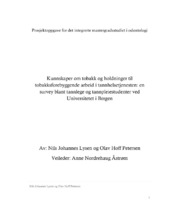Kunnskaper om tobakk og holdninger til tobakksforebyggende arbeid i tannhelsetjenesten: en survey blant tannlege og tannpleiestudenter ved Universitetet i Bergen
Master thesis
Permanent lenke
https://hdl.handle.net/1956/5810Utgivelsesdato
2012-01-30Metadata
Vis full innførselSamlinger
Sammendrag
Knowledge about tobacco and attitudes to tobacco prevention in dental health amongst dental- and dental hygienist students at University of Bergen - a survey. Results from a survey for dental- and dental hygienist students in Bergen spring 2011: Dental health has been seen as an unused resource for tobacco prevention. A survey conducted by SIRUS in 2002 found that dentists and dental hygienists rarely raised questions about smoking to their patients. 216 dental students and 54 dental hygienist students were asked if they would participate in the survey. Questionnaires were sent out via e-mail to a total of 34 dental hygienist students and 126 dental students. The aim of this study was to map the dentist and dental hygienist students tobacco use, where students collected information about to tobacco products, the students' assessment of how harmful the various tobacco products, and the concern that tobacco should be part of dental health prevention and health promotion. Total 10.7% of dental students and 11.8% of the dental hygienist students report that they used snus daily. The corresponding percentages in terms of daily smoking were 1.7% and 2.9%. Those who responded of the dental students believed snus is less harmful than dental hygienist students. Out of the dental hygienist students 94.1% thought snus was harmful, while 58.3% of dental students had this opinion. Average damage assessment for tobacco products were for dentists lower than for the dental hygienist students. Coping expectations towards running tobacco prevention (how easy or difficult students thought it was) had a statistically significant correlation with students' decision to engage in tobacco prevention as workers in dental care. Total 15.6%, of dental nurses and 43.4% of the dentists thought that they would be seen as a moralist if they practiced tobacco prevention in dental health. The perception that the students would do an important job as a dentist / dental hygienist if they practiced tobacco prevention was the strongest motivation to actually do it Kunnskaper om tobakk og holdninger til tobakksforebyggende arbeid i tannhelsetjenesten: en survey blant tannlege og tannpleiestudenter ved Universitetet i Bergen. I en undersøkelse ble 216 tannlegestudenter og 54 tannpleierstudenter invitert til å delta. Spørreskjema ble sendt ut via e-post. I alt svarte 34 (63%) tannpleierstudenter og 126 (58%) tannlegestudenter. Målet med undersøkelsen var å kartlegge tannlege og tannpleierstudentenes tobakksbruk, hvor studentene hentet informasjon med hensyn til tobakksprodukter, studentenes vurdering av hvor skadelig de ulike tobakksprodukter er, og deres holdninger til at tobakk skal være en del av tannhelsetjenestens forebyggende og helsefremmende arbeid. Totalt oppga 10,7 % av tannlegestudentene og 11,8 % av tannpleierstudentene at de snuste daglig. Tilsvarende prosentandeler når det gjelder daglig røyking var 1,7 % og 2,9 %.Tannlegestudentene, anså snus som mindre skadelig enn tannpleierstudentene. Blant tannpleierstudentene, mente 94,1 % at snus var skadelig mot 58,3% av tannlegestudentene. Gjennomsnittlig skadevurdering for tobakksprodukter lå for tannlegene lavere enn for tannpleierstudentene. Mestringsforventninger til det å drive tobakksforebyggende arbeid i tannhelsetjenesten (dvs. hvor lett eller vanskelig studentene mente dette var) hadde en statistisk signifikant sammenheng med studentenes beslutning om å drive tobakksforebygging som utøvende tannhelsearbeidere. Totalt svarte 15.6% av tannpleierne og 43,4% av tannlegene at de ville bli oppfattet som en moralist dersom de drev tobakksforebyggende arbeid i tannhelsetjenesten. Oppfatningen at studentene ville gjøre en viktig jobb som tannlege/tannpleier dersom de drev tobakksforebyggende arbeid var den sterkeste motivasjonen for å bestemme seg for faktisk å gjøre dette.
